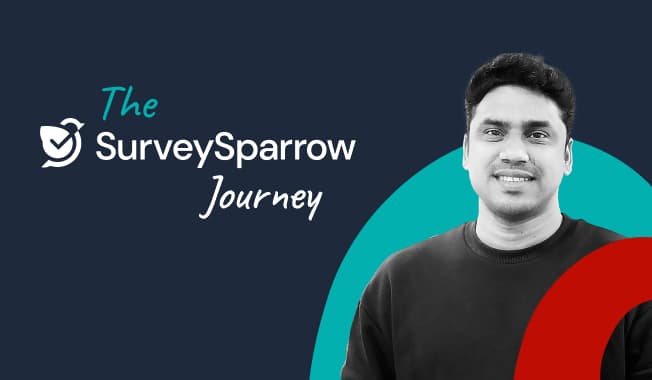Third Time Builder, First Time From Home: The SurveySparrow Story
Article written by
Jaby K J

SHARE THIS ARTICLE
Summary
How a third-time builder chose Kerala over Silicon Valley and built a global product company from Kochi before it was cool thing to do in Kerala Saas Ecosystem.
Building SaaS From Your Backyard: The SurveySparrow Story
Picture this: It's 2017, you've helped build two successful SaaS products at Zoho and Freshworks, and you're ready to start your own company. Where do you go? Chennai? Bangalore? Maybe even the Bay Area?
Shihab Muhammed chose Kochi.
Today, SurveySparrow is a 300+ person company with offices across India, Dubai, and the US. But back then, choosing Kerala for a SaaS startup raised more than a few eyebrows. We caught up with Shihab to understand why he bet on Kerala — and what he's learned about building from home.
1. So Shihab, what made you leave the Chennai-Bangalore circuit and start SurveySparrow from Kerala?
Look, everybody has an attachment to their home state, right? Especially someone like me who was educated in government schools and colleges here. I always knew I wanted to give something back.
But it wasn't just emotion. The idea for SurveySparrow came to me in 2016 when I was at Freshworks. We were using Google Forms internally, and I kept thinking — why is feedback collection still stuck in the email era when everything else has gone conversational?
This was 2015-16, remember? Slack was becoming mainstream, WhatsApp was exploding. Everything was becoming more chatty, more human. But surveys? Still these boring, structured forms that felt like filling out tax documents.
The timing felt right because I saw this massive shift happening — from structured to unstructured communication. And Kerala? The cost of starting was way lower than Chennai. Plus, I'd spent my entire working life in Chennai. It was time to come home.
2. You've seen SaaS scale from zero to $100 million at Freshworks. What did you do differently when starting SurveySparrow?
The core stays the same — if people love your product, they'll use it. Simple as that.
At Freshworks, I learned that you need to be obsessed with one key metric that actually moves the needle. For us, it was response rates. Traditional players like SurveyMonkey were getting 10-15% response rates. We said, "Let's shoot for 40%."
We introduced conversational surveys — making them feel like chats rather than forms. Some of our customers hit 92.7% response rates! Way beyond even our target.
But here's what was different: In Kochi, there was no ready-made talent pool for SaaS. Zero ecosystem. So we went to colleges, hired freshers, and trained them ourselves. We even convinced some folks from Chennai and Bangalore to move here.
I remember we had this company guest house where we'd cook food for people coming from outside Kerala — some of them weren't used to coconut oil-based food, so we made sure they felt at home. It wasn't just about hiring; it was about creating an environment where talent could thrive.
3. You started in Kochi when Kerala was known for IT services, not product companies. How did that shape your journey?
(laughs) It was hard, not going to lie. There was literally no SaaS ecosystem here in 2017.
But you know what? Sometimes constraints force creativity. We couldn't just poach talent from other companies because there weren't any. So we built our own talent pipeline. We went to colleges, found raw talent, and invested heavily in training.
The beautiful thing is, today we've created careers for hundreds of people sitting right here in Kochi. We've shown that you can build world-class products from Kerala. And now there's an actual ecosystem forming — you can feel it.
4. What do Kerala-based founders get wrong about SaaS? And what do they get surprisingly right?
Kerala folks are brilliant at product building. Seriously good. But here's the thing — many haven't seen scale firsthand.
I see a lot of indie hacker mentality, which is great for starting. But if you want to build enterprise-grade software, you need structure. You need pre-sales, sales, customer success, support — all these cogs working together. It's not just about the product anymore.
You know that saying, "You're the average of the five people around you"? That's crucial for scale. You can't do it alone.
But here's what people miss about Kerala talent — we have some of the best writers and designers in India. Look at any major Indian startup, and you'll likely find their chief designer or design head is from Kerala. Same with top publications — check who the editors are.
It's our education system. We grow up reading a lot, thinking critically. That translates beautifully into marketing and design — two crucial pieces for building global products.
5. You've hired teams across Chennai, Bangalore, and Kochi. What's one underrated trait of Kerala teams?
The ability to think and communicate clearly. It sounds simple, but it's rare.
Our early education system emphasizes reading and writing in ways that other states don't. This creates people who can articulate complex ideas simply — whether that's in design, marketing copy, or even technical documentation.
I've seen Kerala designers explain their thinking process in ways that make even non-designers understand the "why" behind their choices. That's powerful when you're building products for a global audience.
6. What advice would you give someone in their 30s at a SaaS company, wondering if they should return to Kerala and start something?
If you're thinking about it, this is probably the best time. Kerala Startup Mission (KSUM) is doing incredible work — the state government is actively promoting startups. They'll give you space, connect you with mentors, help with funding. You don't see this level of state support everywhere.
Look, you can't start something in your 60s, right? Your 30s are when you have the energy, some experience, but still the hunger to prove something.
At the end of the day, it's about what trails you leave behind while walking through life. Do you want to look back and wonder "what if?" Or do you want to look back at the journey and smile?
Starting something is hard wherever you are. But starting from home? There's something special about building where your roots are.
7. If you had to draw Kerala's SaaS map five years from now, what do you see?
I'm already seeing it happen. There are so many small SaaS companies popping up — people from Kerala starting things, some scaling nicely. Mitsogo has shown it's possible to scale from here.
By 2030, I want to see at least 10-25 startups from Kerala doing $10 million-plus in revenue. Not just one or two success stories, but a proper ecosystem.
The key is helping each other, especially in the early days. Any ecosystem needs that pay-it-forward mentality. Share learnings, make introductions, help with hiring. Even something as simple as a coffee chat can change someone's trajectory.
Think about it — Paris is known for luxury and fashion, San Francisco for startups. When an ecosystem really clicks, everyone in that ecosystem benefits. The freshers we train today become the CTOs of tomorrow. The mistakes we share save others years of pain.
That's the Kerala SaaS story I want to see. Not just individual success, but collective growth. And honestly? We're closer than people think.
Jaby K J is a product marketer, part-time writer, and quiet collector of stories. At SurveySparrow, she shapes strategy with words crafting clear positioning and thoughtful GTM plans for B2B SaaS brands. She lives for art, literature, and philosophy, and sees storytelling as the thread that ties it all together.
Related Articles

Finding KPH: Kerala's Hidden Product Hunt Community and What the Past Week Looked Like

Why Kerala Needed a SaaS Community And Why We’re Starting Now
.jpg&w=750&q=75)